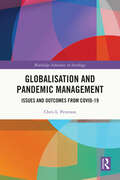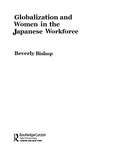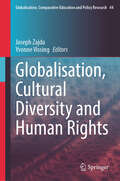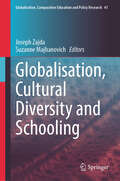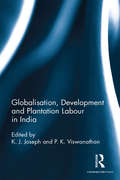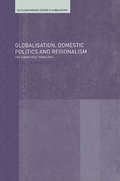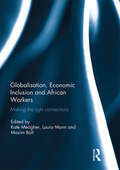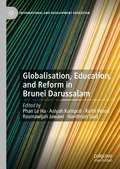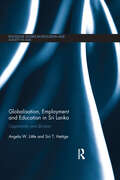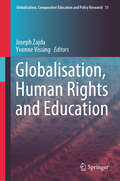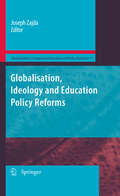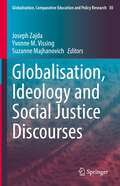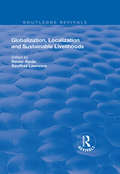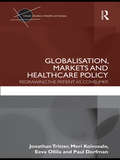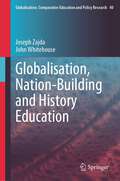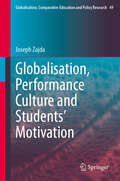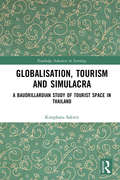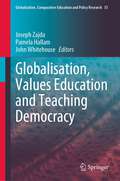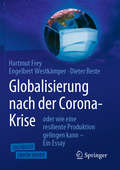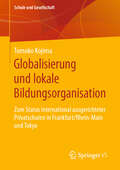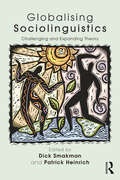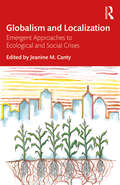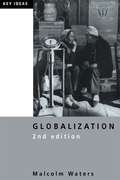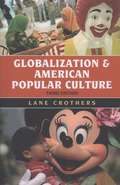- Table View
- List View
Globalisation and Pandemic Management: Issues and Outcomes from COVID-19 (Routledge Advances in Sociology)
by Chris L. PetersonThis book considers the global response on governance after the pandemic while sociologically addressing the effects of COVID-19 on life and work experience.It presents the effects of COVID-19 on global and local labour markets, the development of digitisation and technology, of work health, and on the environment with respect to global warming and climate change. Linking COVID-19 to the progress of globalisation, the book considers the spread of the pandemic and its management as a response to neoliberalism.The book analyses national and international governance models for tackling future outcomes of emerging global issues such as technology, green industry and environment that may inform future management of global crises. As such, it will be of interest to scholars in the field of Global Studies, Governance, International Relations, Political Science, Complexity Studies, Environment Studies, Sociology, Disaster Management and Occupational Health.
Globalisation and Women in the Japanese Workforce (The University of Sheffield/Routledge Japanese Studies Series)
by Beverley BishopGlobalisation and Women in the Japanese Workforce contributes to the debate about the impact of globalisation upon women. It examines the effect of restructuring upon women's employment in Japan and describes the actions women are taking individually and collectively to campaign for change in their working environment and the laws and practices regulating it.
Globalisation, Cultural Diversity and Human Rights (Globalisation, Comparative Education and Policy Research #44)
by Joseph Zajda Yvonne VissingThis book analyses major discourses of cultural diversity and human rights. The chapters contained in this book examine critically major issues confronting cultural diversity and human rights, both locally and globally. They analyze the challenges that different societies are confronted with, as they attempt to implement, protect and defend cultural diversity and human rights in an ever-changing world, and culturally diverse environment. Topics covered include celebrating cultural diversity in sport, human rights legacies of the African slave trade and the long-term implications of colonialism, assessment of human rights and sports, effectiveness in intercultural dialogue in dominant discourses of cultural diversity and human rights, and the rising importance of cultural diversity and human rights in sport for children and youth.This book will be helpful to readers to explore their own views and consider more broadly what may be in the best interests of a fair and just society, as envisioned in human rights treaties, human rights education in schools, and cultural diversity.
Globalisation, Cultural Diversity and Schooling (Globalisation, Comparative Education and Policy Research #41)
by Joseph Zajda Suzanne MajhanovichThis book analyses dominant discourses of globalisation, cultural diversity and schooling. The collection in this volume advance further the discussions on the phenomenon of globalisation, and its far-reaching effects on our world, and consider cultural diversity in its broadest sense, as it manifests itself in a globalised world. Zajda has argued that globalisation represents a synthesis of technology, ideology and organisation, specifically related to border crossings of people, global finance and trade, IT convergence as well as cross-cultural communication. The reality of cultural diversity has been brought into stronger focus because of globalisation. Cultural diversity, always present in society is more evident today because of globalisation. The ways society copes with cultural diversity have changed such that the embrace of cultural diversity as part of identity is encouraged in liberal democracies. Cultural diversity, as presented in this volume is seen in a broad contextand includes factors such as race, ethnicity, gender, sexual orientations, socio-economic status, culture, age, and physical ability as well as a variety of beliefs and values. The book contributes in a very scholarly way, to a more holistic understanding of the nexus between globalisation, cultural diversity, democracy, and equality for all.
Globalisation, Development and Plantation Labour in India
by P. K. Viswanathan K. J. JosephThis book provides a detailed examination of the impact of globalisation on plantation labour, dominated by women labour, in India. The studies presented here highlight the perpetuation of low wages, inferior social status and low human development of workers in this sector and point out the movement of labour away from this sector and the resultant labour shortage. It also highlights the perils involved in doing away with the Plantation Labour Act 1951 and provides a plausible way forward for improving the conditions of plantation workers. <P><P> Rich in empirical analysis, this volume will prove essential for scholars and researchers of labour economics, development studies, gender studies and sociology.
Globalisation, Domestic Politics and Regionalism (Routledge Studies in Globalisation)
by Helen E.S. NesaduraiThis book examines the relationship between globalisation and regionalism through a detailed analysis of the ASEAN Free Trade Area (AFTA) project. It analyses how the interaction between globalisation and domestic politics shaped the evolution of AFTA over the past 10 years, arguing that although AFTA was triggered primarily by the pressures of globalisation, it was a tussle between the imperatives of growth and domestic distribution that shaped the way economic cooperation unfolded and the forms it took.
Globalisation, Economic Inclusion and African Workers: Making the Right Connections
by Maxim Bolt Kate Meagher Laura MannThis book addresses the question of whether greater inclusion in the global economy offers a solution to rising unemployment and poverty in contemporary Africa. The authors trace the connection between global demographic change and new mechanisms of economic inclusion via global value chains, digital networks, labour migration, and corporate engagement with the bottom of the pyramid, challenging the claim that African workers have become functionally irrelevant to the global economy. They expose the shift of global demand for African workers from formal to increasingly informalised labour arrangements, mediated by social enterprises, labour brokers, graduate entrepreneurs and grassroots associations. Focusing on global employment connections initiated from above and from below, the authors examine whether global labour linkages increase or reduce problems of vulnerable and unstable working conditions within African countries, and considers the economic and political conditions needed for African workers to capture the gains of inclusion in the global economy. This book was previously published as a special issue of the Journal of Development Studies.
Globalisation, Education, and Reform in Brunei Darussalam (International and Development Education)
by Le Ha Phan Keith Wood Asiyah Kumpoh Rosmawijah Jawawi Hardimah SaidThis book focuses on the intertwined relationships between globalisation, nation-building, education, and reform as manifested throughout the modern history of Brunei Darussalam, an Islamic monarchy located on the island of Borneo in Southeast Asia. It is the first book dedicated to the examination of Brunei’s education system, schooling, teacher education, and society in close connection with the national philosophy Melayu Islam Beraja (MIB) or Malay Islamic Monarchy. The authors provide a historical understanding of the country’s education and tell Brunei’s story of educational reform and change in its own language, narratives, accounts, and unique standpoints. Interdisciplinary chapters draw on significant historical and textual sources in three languages, namely Arabic, English, and Malay, to contribute to scholarship on education studies, international and comparative education, and international and development education.
Globalisation, Employment and Education in Sri Lanka: Opportunity and Division (Routledge Studies in Education and Society in Asia)
by Angela W. Little Siri T. HettigeSince the late 1970s, Sri Lanka has undergone a socio-economic transformation, from protectionism towards economic liberalisation and increasing integration into the world economy. Through a systematic comparison of these periods of economic change (1956–1977, and 1977 to the present), Angela W. Little and Siri T. Hettige examine the impact of this transformation on education, youth employment and equality of opportunity in Sri Lanka. The book charts Sri Lanka’s shift from a predominantly agricultural economy to one dominated by services and manufacturing, a reduction in unemployment, rising educational and occupational levels, expectations and achievements, and a reduction in poverty. In turn, it reveals a growing role for the private sector and foreign interests in post-secondary education and a modest growth in private education at the primary and secondary levels, as well as widening social disparities in access to qualifications, training and skills. The Sri Lankan experience of, and engagement with, globalisation has been tempered by a long-running ethnic conflict that hindered economic and social development and diverted considerable public funds into defence and war. Now that the war is ‘won’, the challenge is how to invest in human resource development and the fulfilment of the expectations of youth from all ethnic and social groups. This challenge requires serious policy analysis, the generation of more state revenues, the reallocation of existing public resources, and a political commitment to the winning of a sustainable peace and stability. This book makes an important contribution to the broader international literature on the implications of globalisation for education policy and practice, and to the interaction of exogenous and endogenous forces for educational change. It deals with the tension between the high social demand for education and the growing demand for specialised skills in a changing economy. As such, it has a wide interdisciplinary appeal across education policy and politics, Asian education, South Asian society, youth policy, sociology of education, political economy of social change, and globalisation.
Globalisation, Human Rights and Education (Globalisation, Comparative Education and Policy Research #51)
by Joseph Zajda Yvonne VissingThis book analyses major discourses of human rights and education. It examines critically major issues confronting human rights and education, both locally and globally. The various chapters analyze the challenges that different societies are faced with, as they attempt to implement, protect and defend democracy, cultural diversity and human rights in schools. The book helps readers to explore their own views and consider more broadly what may be in the best interests of a fair and just society, as envisioned in human rights treaties, human rights education in schools, and cultural diversity.
Globalisation, Ideology and Education Policy Reforms
by Joseph ZajdaThe eleventh in the 12-volume book series Globalisation, Comparative Education and Policy Research, this work sets out to explore the interrelationship between ideology and education reforms, setting it in a global context. With this as its focus, the chapters represent hand-picked scholarly research on major discourses in the field of comparative education. A compendium of the very latest thinking on the subject, this volume is, like the others in the series, a state-of-the-art sourcebook for researchers, practitioners and policymakers alike. Not only do the chapters offer a timely overview of current issues affecting comparative education and education policy research in what is now a global educational culture, but the work also contains ideas about future directions that policy reforms could take. The book draws upon recent studies in the areas of globalisation, equity, and the role of the State. It explores conceptual frameworks and methodological approaches applicable in the research covering the State, globalisation, and education reforms. The research evinces the neo-liberal ideological imperatives of current education and policy reforms, and illustrates the way that shifts in the relationship between the State and education policy affect current trends in education reforms and schooling globally. Individual chapters critically assess the dominant discourses and debates on comparative education research in education and policy reforms. Using diverse comparative education paradigms from critical theory to globalisation, the authors focus on globalisation, ideology and democracy and examine both the reasons and outcomes of education reforms, policy change and transformation. They provide a more informed critique of models of accountability, quality and school effectiveness that are informed by Western social values. The book also draws upon recent studies in the areas of equity, cultural capital and dominant ideologies in education.
Globalisation, Ideology and Social Justice Discourses (Globalisation, Comparative Education and Policy Research #30)
by Joseph Zajda Suzanne Majhanovich Yvonne M. VissingThis book examines dominant discourses in social justice education globally. It presents cutting-edge research on the major global trends in education, social justice and policy research. Using diverse paradigms, ranging from critical theory to discourse analysis, the book examines major social justice and equity education reforms and policy issues in a global culture, with a focus on the ambivalent and problematic relationship between social justice education discourses, ideology and the state. The book discusses democracy, ideology and social justice, which are among the most critical and significant factors defining and contextualising the processes surrounding social justice education reforms globally. It critiques current social justice education practices and policy reforms, illustrating the shifts in the relationship between the state, ideology, and social justice education policy.Written by authors from diverse backgrounds and regions, this book examines current developments in research concerning social justice education. It enables readers to gain a more holistic understanding of the nexus between social justice education, and dominant ideologies, both locally and globally. It also provides an easily accessible, practical, yet scholarly insights into local and global trends in the field of social justice education. Discourses of Globalization, Ideology and Social Justice, with contributions from key scholars worldwide, should be required reading for a broad spectrum of users, including policy-makers, academics, graduate students, education policy researchers, administrators, and practitioners.
Globalisation, Localisation and Sustainable Livelihoods
by Geoffrey Lawrence Reidar AlmasThis title was first published in 2002. One of the greatest concerns facing the world is how to ensure that sustainable outcomes are generated as globalization proceeds apace. Quite simply, many people are finding their life chances deteriorating - with resistance to globalization being a common response. The question is: is it possible to guarantee sustainable livelihoods for individuals, families and communities as global processes increasingly shape local social relations? This volume is a collection of 16 chapters from leading rural sociologists and human geographers based in Europe, Australasia, and the Americas. The book, in three parts, deals with globalization and food; the restructuring of local agriculture; and communities and resistance in a globalizing world. The introduction to the book compares and contrasts the various experiences of communities in countries such as Australia, Brazil, Finland, Norway, South Africa and the United States as they "struggle" to cope with globalization and its effects. Each chapter discusses options to ameliorate the local consequences of global change.
Globalisation, Markets and Healthcare Policy: Redrawing the Patient as Consumer (Critical Studies in Health and Society)
by Jonathan Tritter Meri Koivusalo Eeva Ollila Paul DorfmanAlthough the last two decades have seen the healthcare systems of most developed countries face pressure for major reform, the impact of this reform on the relationship between empowerment, consumerism and citizen’s rights has received limited research attention. Globalisation, Markets and Healthcare Policy sets out to redress this imbalance. This book explores the extent to which globalisation and commercialisation relate to current and emerging health policies. It also looks at the implications for citizens, patients and social rights, as well as how policy making interacts with the interests of global and European trade and economic policies. Topics discussed include: How the impact of globalisation on health systems is apparent in the influence of international actors and European policies. How the impact of globalisation is mediated by national priorities and policies and is therefore reflected in diverse influences. How commercialisation of health is presented as benefiting citizens and patients but has the potential to undermine the aims and values inherent in health systems. How the role of citizens' interests, social rights, patient’s rights and priorities of patient and public involvement need to be separated from commercialisation, choice and consumerism in health care. Essential reading for policy makers and students of public policy, politics, law and health services, Globalisation, Markets and Healthcare Policy will also appeal to those interested in patient involvement international healthcare, international relations, trans-national organisations and the EU.
Globalisation, Nation-Building and History Education (Globalisation, Comparative Education and Policy Research #40)
by Joseph Zajda John WhitehouseThis book uses historiography and discourse analysis to provide a new insight into understanding the nexus between ideologies, the state, and nation-building—as depicted in history school textbooks. It focuses on the interpretation of social and political change, significant events, and examining possible new biases and omissions in school textbooks. The ‘Europeanization’ of history textbooks in the EU is an example of western-dominated Grand Narrative of pluralist democracy, multiculturalism, and human rights, according to the canon of a particularly European dimension. Various public debates in the USA, China, the Russian Federation (RF), Japan, and elsewhere, dealing with understandings of a nation-building, national identity, and history education point out to parallels between the political significance of school history and the history education debates globally.The book demonstrates that the issue of national identity and balanced representations of the past continue to dominate the debate surrounding the goals, dominant ideologies and content of history textbooks, and historical narratives. It concludes that competing discourses and ideologies will continue to define and shape the nature and significance of historical knowledge, ideologies and the direction of values education in history textbooks. This book provides an easily accessible, practical, yet scholarly insights into local and global trends in the field of history education, and should be required reading for a broad spectrum of users, including policy-makers, academics, graduate students, education policy researchers, administrators, and practitioners.
Globalisation, Performance Culture and Students’ Motivation (Globalisation, Comparative Education and Policy Research #49)
by Joseph ZajdaThis book analyses education policy trends that affects performing culture, academic excellence and global competitiveness in schools. It focuses on students’ cultural identities and engagement, inclusive schooling, eliminating discrimination and discriminatory practices in the classroom, and relevant values education. One of the major effects of cultural and economic forces of globalisation is that schools and school leaders, like other educational organisations, having modelled their goals and strategies on the entrepreneurial business model. They are compelled to embrace the corporate ethos of efficiency, accountability, performance, and profit-driven managerialism. This corporate ethos reflects a dominant neo-liberal ideology, which exerts a powerful influence on major discourses of democracy, equality, social justice, and education, both locally and globally. By examining the education policy shifts in the use of major discourses concerning performing culture and education, this book offers a comprehensive synthesis of the intersecting and diverse discourses of globalisation, cultural diversity, performing culture, and education. It provides innovative ideas concerning the future directions for authentic models of globalisation, performance culture and students’ motivation.
Globalisation, Tourism and Simulacra: A Baudrillardian Study of Tourist Space in Thailand (Routledge Advances in Sociology)
by Kunphatu SakwitThis book draws on the thought of Baudrillard to explore the effects of globalisation and tourism in a Thai context. Arguing that tourism does not necessarily erode local culture but that local culture can in fact be recreated through globalisation and tourism, the author employs studies of the Damnoen Saduk and Pattaya floating markets, showing them to be simulations of Thai culture that undergo changes of form, cultural content and activity, through various stages of representation. With a focus on the themes of the circulation of value and signs, the play of differences and orders of simulacra, this volume examines the extent to which Baudrillard’s theory can apply in a non-western context and in relation to tourism. A study of consumption, tourism and the relations between the global and the local, Globalisation, Tourism and Simulacra will appeal to scholars of sociology and geography with interests tourism, globalisation and social theory.
Globalisation, Values Education and Teaching Democracy (Globalisation, Comparative Education and Policy Research #35)
by Joseph Zajda Pamela Hallam John WhitehouseThis book critiques dominant discourses and debates pertaining to values education, cultural identity and teaching democracy, set against the backdrop of growing social stratification and unequal access to quality education. It addresses discourses concerning globalisation, ideologies and the state, as well as approaches to values education and teaching democracy in schools. The book explores the ambivalent and problematic connections between the state, globalisation, values education and teaching democracy. It also explores conceptual frameworks and methodological approaches applicable to research on values education, multiculturalism and identity politics. Drawing on diverse paradigms, ranging from critical theory to globalisation, and by focusing on globalisation, ideology and values education, the book critically examines research dealing with cultural diversity and its impact of identity politics. Given the need for a multiple perspective approach, the authors have diverse backgrounds and hail from different countries and regions, offer a wealth of insights, contributing to a more holistic understanding of the nexus between values education, multiculturalism and national identity. With contributions from key scholars worldwide, the book should be required reading for a broad spectrum of users, including policy-makers, academics, graduate students, education policy researchers, administrators and practitioners.
Globalisierung nach der Corona-Krise: oder wie eine resiliente Produktion gelingen kann – Ein Essay
by Engelbert Westkämper Dieter Beste Hartmut FreyUnterbrochene Lieferketten, Schwierigkeiten im Nachschub einfachster medizinischer Schutzkleidung (z. B. Mundschutz) im Rahmen der Corona-Krise bieten Anlass die Globalisierung zu hinterfragen. Den gegenwärtigen Spielregeln der Globalisierung sind die Perspektiven einer digitalisierten Wirtschaftsordnung mit entsprechenden Geschäftsmodellen für die Zukunft gegenübergestellt. Es ist dargelegt, welche Prozesse und Verfahren diese Entwicklung unterstützen und es ist ein Ausblick gegeben, wie sich diese Entwicklung auch auf bildungs- und forschungspolitische Aspekte auswirken kann.
Globalisierung und lokale Bildungsorganisation: Zum Status international ausgerichteter Privatschulen in Frankfurt/Rhein-Main und Tokyo (Schule und Gesellschaft #71)
by Tomoko KojimaDie qualitative Vergleichsstudie beschäftigt sich mit der Frage, wie sich die lokale Bildungsorganisation gegenwärtig hinsichtlich der Globalisierung und der Präsenz der Privatschulen mit internationalem Profil verändert. Betrachtet werden exemplarische Fälle in zwei global cities, Frankfurt/Rhein-Main und Tokyo. Dabei werden unterschiedliche Formen international ausgerichteter Privatschulen sowie ihre Differenzierung von bzw. Identifikation mit dem lokalen Bildungskontext aufgezeigt. Die damit einhergehende Überschreitung von Grenzen im nationalstaatlichen Erziehungssystem und deren Folgen werden semantisch aus der Governance-Perspektive sowie aus systemtheoretischer Sicht regional kontrastierend diskutiert.
Globalising Sociolinguistics: Challenging and Expanding Theory
by Dick Smakman Patrick HeinrichThis book challenges the predominance of mainstream sociolinguistic theories by focusing on lesser known sociolinguistic systems, from regions of Africa, Asia, the Caribbean, South America, the European Mediterranean, and Slavic regions as well as specific speech communities such as those speaking Nivkh, Jamaican Creole, North Saami, and Central Yup’ik. In nineteen chapters, the specialist authors look at key sociolinguistic aspects of each region or speech community, such as gender, politeness strategies, speech patterns and the effects of social hierarchy on language, concentrating on the differences from mainstream models. The volume, introduced by Miriam Meyerhoff, has been written by the leading expert of each specific region or community and includes contributions by Rajend Mesthrie, Marc Greenberg and Daming Xu. This publication draws together connections across regions/communities and considers how mainstream sociolinguistics is incomplete or lacking. It reveals how lesser-known cultures can play an important role in the building of theory in sociolinguistics. Globalising Sociolinguistics is essential reading for any researcher in sociolinguistics and language variation and will be a key reference for advanced sociolinguistics courses.
Globalism and Localization: Emergent Solutions to Ecological and Social Crises
by Jeanine M. CantyConsidering the context of the present ecological and social crisis, this book takes an interdisciplinary approach to explore the relationship between globalism and localization. Globalism may be viewed as a positive emergent property of globalization. The latter depicts a worldwide economic and political system, and arguably a worldview, that has directly increased planetary levels of injustice, poverty, militarism, violence, and ecological destruction. In contrast, globalism represents interconnected systems of exchange and resourcefulness through increased communications across innumerable global diversities. In an economic, cultural, and political framework, localization centers on small-scale communities placed within the immediate bioregion, providing intimacy between the means of production and consumption, as well as long-term security and resilience. There is an increasing movement towards localization in order to counteract the destruction wreaked by globalization, yet our world is deeply and integrally immersed within a globalized reality. Within this collection, contributors expound upon the connection between local and global phenomenon within their respective fields including social ecology, climate justice, ecopsychology, big history, peace ecology, social justice, community resilience, indigenous rights, permaculture, food justice, liberatory politics, and both transformative and transpersonal studies.
Globalization (Key Ideas)
by Malcolm WatersThe constraints of geography are shrinking and the world is becoming a single place. Globalization and the global society are increasingly occupying the centre of sociological debates. Widely discussed by journalists and a key goal for many businesses, globalization has become a buzz-word in recent years. In this extensively revised and restructured new edition of Globalization , Malcolm Waters provides a user-friendly introduction to the main arguments about the process, including a chapter on the critiques of the globalization thesis that have emerged since the first edition was published.
Globalization East and West: Perspectives From The Gulf (Encounters: An International Journal For The Study Of Culture And Society Ser. #Vol. 8)
by Bryan S. Turner Habibul H. KhondkerDo we confuse globalization for Americanization? What are the distinctive elements in the interplay of the local and the global?<P><P> This much needed book is the first full length text to examine globalization from the perspective of both the West and the East. It considers globalization as a general social and economic process, and the challenges it presents for Western social science. <P> The meaning of a global perspective is explored through various concrete examples: religion, migration, medicine, terrorism, global disasters, citizenship, multiculturalism, media and popular culture. <P> Introduced with a forword from Roland Robertson, the book is brimming with novel interpretations and fresh insights that will contribute to illuminating the practical realities of globalization.
Globalization and American Popular Culture (Globalization)
by Lane CrothersNow in a fully revised and updated edition, this concise and insightful book explores the ways American popular products such as movies, music, television programs, fast food, sports, and even clothing styles have molded and continue to influence modern globalization. Lane Crothers offers a nuanced examination of both the appeal of American products worldwide and the fear and rejection they induce in many people and nations around the world. The author defines what we mean by "popular culture," how popular culture is distinguished from the generic concept of "culture," and what constitutes "American" popular culture. Tracing how U.S. movies, music, and TV became dominant in world popular culture, Crothers also considers the ways in which non-visual products like fast-food franchises, sports, and fashion have become ubiquitous. Concluding with a projection of the future impact of American popular culture, this book makes a powerful argument for its central role in shaping global politics and economic development.
